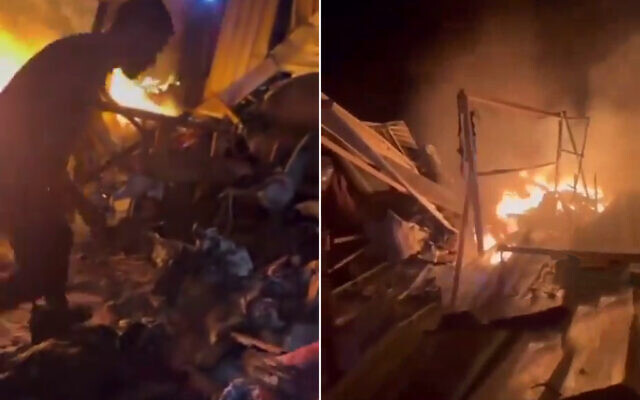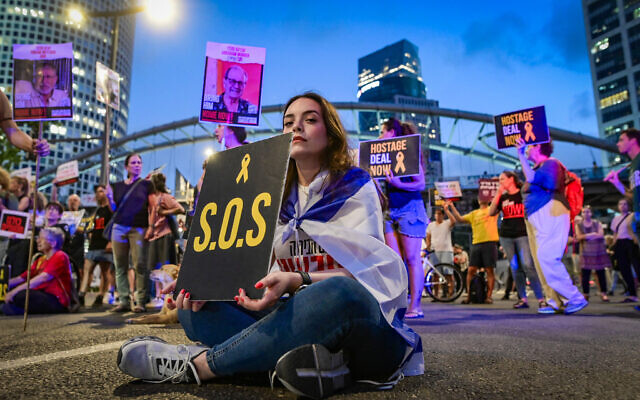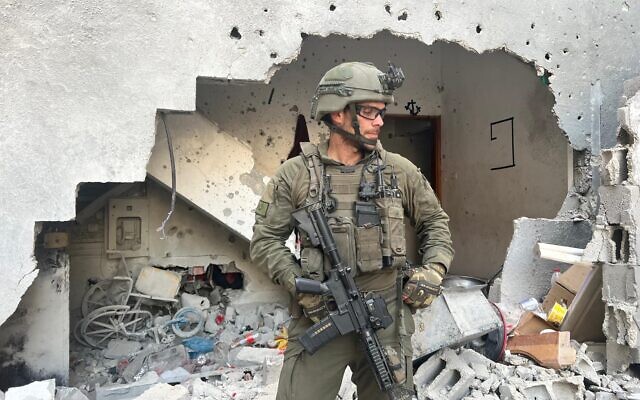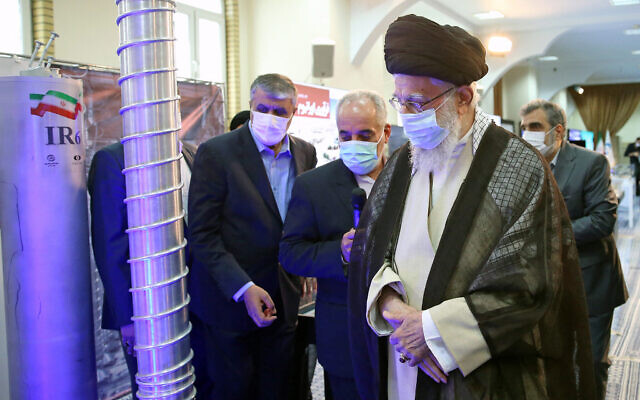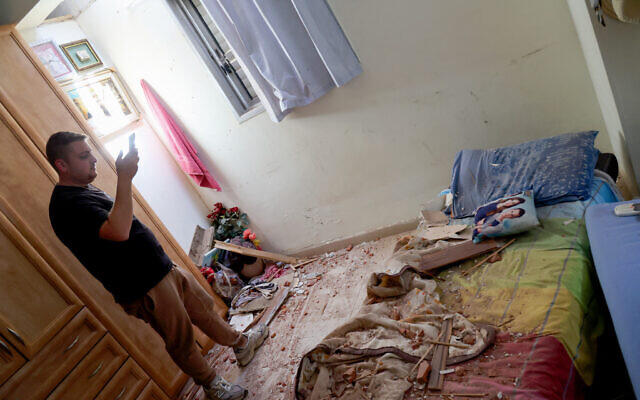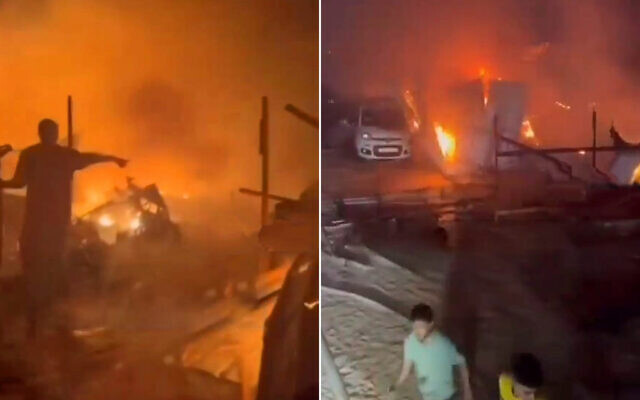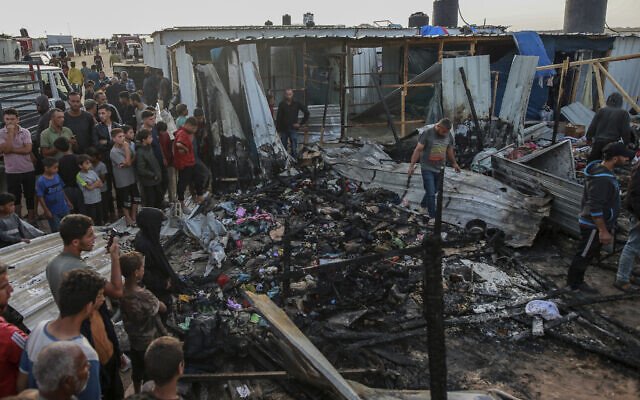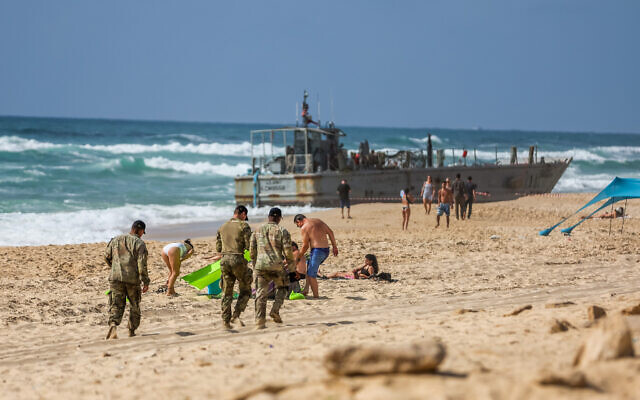Israel Prize ceremony goes ahead after selection process marred by controversies
Awards, held in war-battered Sderot, given in two new prize categories — Societal Responsibility and Citizen Heroism — created to mark October 7 massacre and war on Hamas
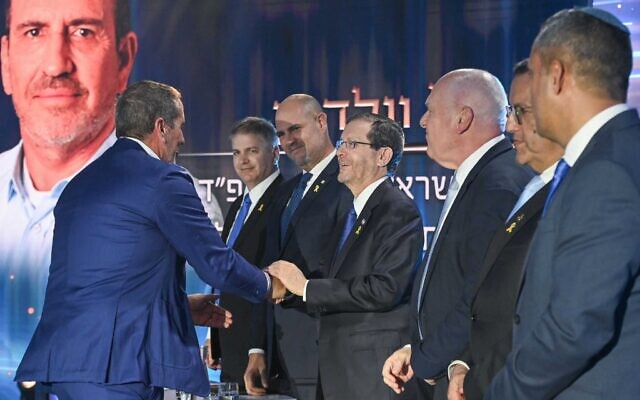
This year’s Israel Prize winners received their awards in a modest ceremony held in the beleaguered southern city of Sederot, the first time since the prize was inaugurated in 1953 that the prizes weren’t awarded in a state ceremony in Jerusalem.
The award ceremony, usually a lavish, celebratory affair attended by numerous dignitaries, this year began at 6:30 p.m. and took place in the Sderot Community Center.
Among the officials in attendance were Education Minister Yoav Kisch, whose plans for the event were mired in various controversies this year, President Isaac Herzog, Knesset Speaker Amir Ohana, acting Supreme Court President Uzi Fogelman, Jerusalem Mayor Moshe Lion and Sderot Mayor Alon Davidi.
Prime Minister Benjamin Netanyahu was absent, after reportedly choosing to forgo the majority of this year’s Independence Day events in favor of concentrating on the war and after being heckled the night before.
In his opening remarks, Kisch acknowledged the somber mood that has underscored the majority of the day’s events this year, noting that “in these complex days, it is difficult to give awards and to celebrate.”
“Therefore, we have chosen to focus this year’s Israel Prize on revival, civil heroism, and societal responsibility,” he continued. “The national strength of the State of Israel is not based only on tanks, planes and bombs. It is based on the spirit of heroism, love of man and country, on inventions and groundbreaking studies, on culture and art and on the life’s work of the individual for the sake of the nation.”
In December, Kisch announced the unusual addition of two new prize categories, created especially to mark the Israel-Hamas conflict: “Societal Responsibility” for civil efforts and volunteering, and “Citizen Heroism” for civilian acts of bravery in helping others during the crisis. Initially, it was announced that each of the two new categories would be awarded to six recipients, but that was later scaled back.
Then in February, he announced that because of the war, the prize would be given in the two new categories only, setting off a storm of protest, especially from the academic community. Reports later surfaced that Kisch had scrapped the regular categories to avoid granting an award to businessman Eyal Waldman, a prominent critic of the government’s judicial overhaul agenda whose daughter was murdered in the Supernova massacre on October 7. Waldman was reportedly the selection committee’s favored candidate.
The regular prize categories were later reinstated in March, after several petitions to the High Court and amid plans by Israel’s universities to hold an alternative ceremony of their own with the traditional categories.

The controversies surrounding this year’s Israel Prize continued even after Kisch reinstated the regular categories, however.
Last week, the High Court of Justice rejected several petitions requesting that the Israel Prize in the field of Torah literature be denied to Chief Rabbi Yitzhak Yosef. The petitions cited controversial comments he has made regarding ultra-Orthodox enlistment to the IDF, especially in March when Yosef threatened that if ultra-Orthodox men were to be legally required to enlist in the army, the Haredi community would leave Israel, generating outrage from civil society groups and politicians.
The decision to hold the prize ceremony in Sderot for the first time was announced in March, to the anger of Jerusalem’s Lion and several others.
Sderot was one of the towns hit by Hamas’s October 7 attack on southern Israel, and has for years been a symbol of southern communities under threat by Gaza rockets.
“The wounds of October 7 have not yet healed, tens of of thousands have been evacuated from their homes, 132 hostages are still held captive by Hamas,” Kisch said of the circumstances surrounding this year’s Israel Prize. “And at the moment, our soldiers are fighting and some of them are giving their lives in the defense of our homeland.”
Turning his attention to the Israel Prize itself, Kisch said that after a deeply polarizing year — caused largely by divisions over the government’s contentious judicial overhaul plans — and since the October 7 Hamas massacre, “we have seen the people of Israel at their best.”
“We saw manifestations of societal responsibility, mutual help, people who went out to save their siblings without checking whether they were wearing a kippah or a hat, if they voted right or left, without asking if they supported the protests or the judicial overhaul or if they demonstrated for or against the government,” he added.
This year, the Lifetime Achievement Prize was given posthumously to the late Edna Solodar, a former Knesset member and fighter in Israel’s War of Independence, who passed away in early April, the day after she received notice she had been awarded the prize.
A second Lifetime Achievement award was given to veteran filmmaker Moshe Edri for his “groundbreaking work and significant contribution to Hebrew arts and to the encouragement of Israeli cinema.”
Basketball player Miki Berkovich, considered one of the best Israeli basketball players of all time, received the Israel Prize in the category of outstanding athletic achievement.
Dr. Cochav Elkayam-Levy won the prize for Societal Responsibility for her work in bringing attention to Hamas’s crimes against women and children during the October 7 atrocities.
Elkayam-Levy and the late Solodar were the only women who received the award this year.
The prize for Citizen Heroism was awarded to Dr. Chen Kugel, director of the National Institute of Forensic Medicine, for his work leading the institute and his efforts to identify the murdered and fallen since October 7.

Also receiving a prize for Citizen Heroism was “Team Elhanan,” Menachem Kalmanson and Itiel Zohar of the West Bank settlement of Otniel, for their bravery in saving civilians during the battles outside the Gaza Strip on October 7. Kalmanson and Zohar became known as “Team Elhanan” because Kalmanson’s brother, Elhanan Kalmanson, was killed during the battle.
“On Saturday afternoon, Elhanan, my brother who I miss so much today, called and asked Itiel and me to go with him to the south,” Menachem said in an emotional speech at the prize ceremony. “We didn’t ask ourselves why we were doing it, it was clear… When your brother is in danger, you have no choice.”

“For a brother, you would do anything,” he added. “Like all love for a brother, it doesn’t matter how much you are asked to explain, it’s not always possible to explain what makes your brother special.”
The award in Communications was given to veteran investigative journalist and author Shlomo Nakdimon, who once served as prime minister Menachem Begin’s media adviser.
After the controversy surrounding his award, businessman Waldman shook hands with Kisch as he received the prize in Entrepreneurship and Technological Innovation.
Sephardic Chief Rabbi Yosef was also on hand to receive his prize in Torah Literature.
Other winners were: Prof. Gershon Ben Shachar of Hebrew University, for Psychology Research; Prof. Hagai Bergman of Hebrew University, for Life Sciences Research; Prof. Vitali Milman of Tel Aviv University, for Mathematics, Computer Science and Engineering Research; and Prof. Yaakov Ritov of Hebrew University, for Economic and Statistics Research.
The Israel Prize has been awarded to Israelis in the fields of social sciences, humanities, life and exact sciences, art, and special contributions to the State of Israel and Israeli society since it was founded in 1953 by then-education minister Ben-Zion Dinor. It has been awarded every year since, even in years when Israel was at war. The award process is done through public nominations and then decisions by specialized committees.
The Israel Prize is considered the country’s highest and most prestigious civilian honor and is usually given to individuals who have made a considerable mark on Israeli society over a period of many years. It is a civilian award and does not include heroic acts or achievements by Israelis while serving in security roles.
Hours before Tuesday evening’s Israel Prize awards ceremony began, five recipients of this year’s prize delivered a statement calling for the government to agree to a deal to return the hostages.
Speaking from Sderot, Prof. Tsevi Mazeh, who received the Israel Prize for his work in the field of physics, said that the absence of the hostages “clouds all of our pride and joy.”
“We stand here on your behalf to call on the government to do everything to bring about the release of the hostages immediately. As a society and as a country, we must set free the people who were abandoned by the state and by the IDF.
“Even the just goal of the war on Hamas cannot come before our obligation to do everything we can for the hostages,” he added.



